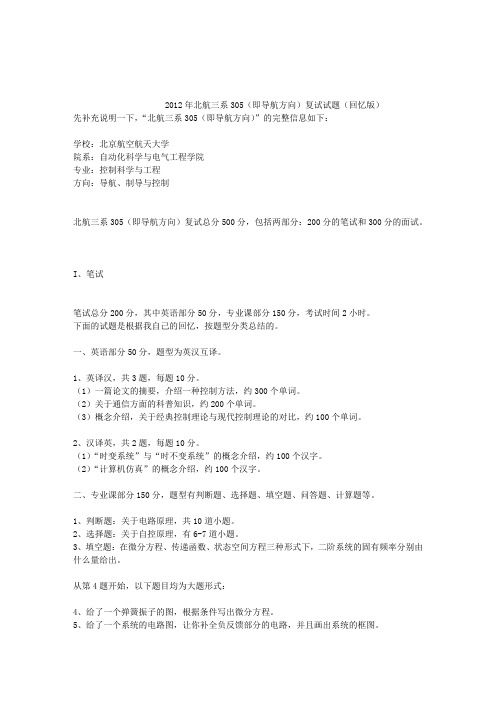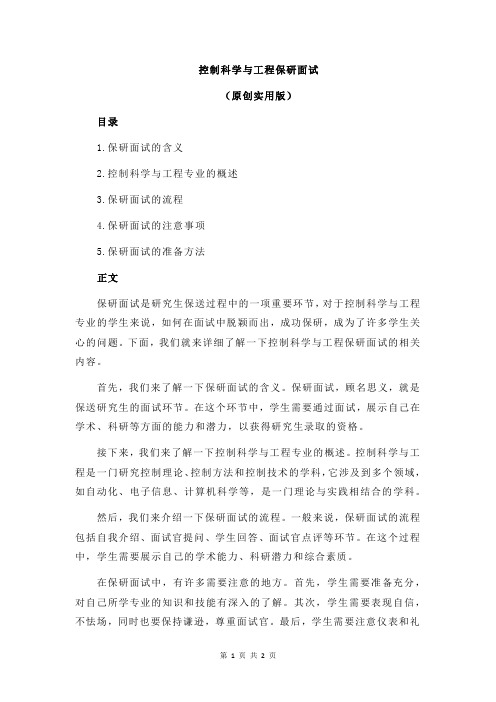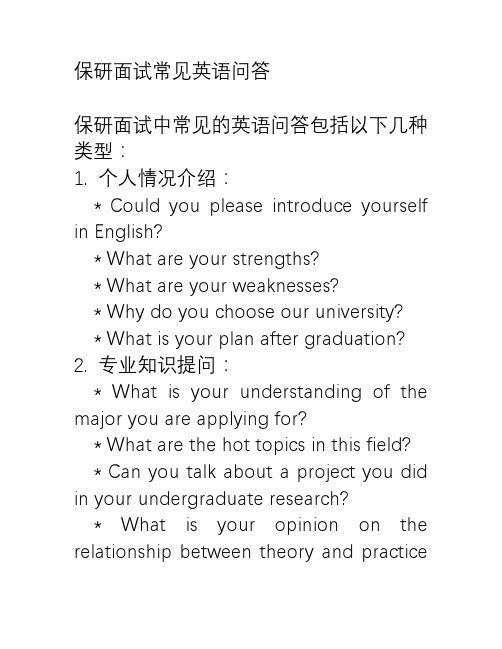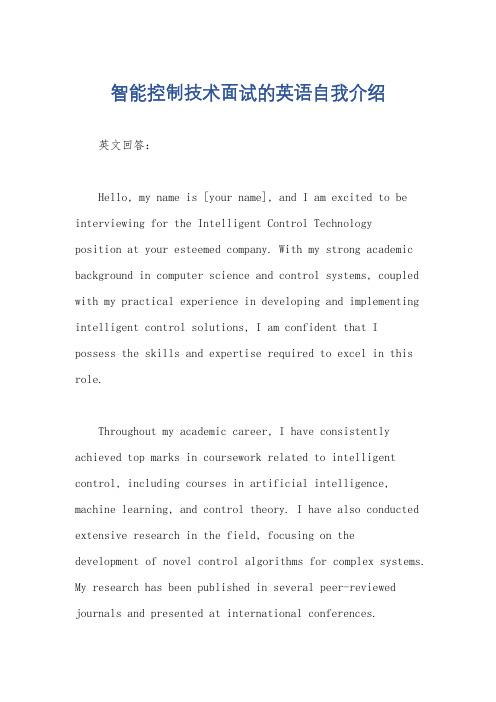控制科学与工程英语面试问答
控制科学与工程专业研究生复试面试问题分类汇总

控制科学与工程专业研究生复试面试问题
分类汇总
数学基础
1. 你觉得微积分/线性代数/概率论和数理统计在控制理论中的重要性是什么?
2. 简单介绍下拉格朗日乘数法,你在哪些场景下用到过?
3. 数学是控制理论的基础,你自学过哪些高等数学课程?
4. 偏微分方程是控制科学与工程领域的一个重要分支,你在求解偏微分方程时用过的方法是什么?
专业课程
1. 你觉得自动控制原理这门课程的难点在哪里?
2. 简单介绍下控制系统设计方法中的根轨迹法和频率响应法,它们有什么应用场景?
3. 你对机器研究的了解是什么?之前有在什么项目中应用过机器研究算法吗?
4. 如何评价现代控制理论在控制领域中的应用前景?
科研经历
1. 简要介绍你在本科或研究生期间的科研经历和成果。
2. 你在科研中遇到过的最大问题是什么,你是如何解决的?
3. 你的研究方向是什么?你是否有自己的研究想法或愿望?
4. 你目前的研究团队中,你扮演的角色是什么?
实践经验
1. 你是否参加过科技竞赛或创业比赛?有哪些获奖经历?
2. 实经历和工作经历对你的专业发展有什么帮助?
3. 你的编程能力如何?熟悉哪些编程语言和工具?
4. 你认为自己的最大优势是什么,如何体现在你的专业领域中?
其他问题
1. 你的兴趣爱好是什么?如何平衡兴趣爱好和研究/工作?
2. 列举你的长期职业目标,以及如何通过研究生研究实现这些
目标。
3. 你觉得研究生的最大价值是什么?
4. 有什么问题想要问我?。
2012年北航三系305(即导航方向)复试试题(回忆版)

2012年北航三系305(即导航方向)复试试题(回忆版)先补充说明一下,“北航三系305(即导航方向)”的完整信息如下:学校:北京航空航天大学院系:自动化科学与电气工程学院专业:控制科学与工程方向:导航、制导与控制北航三系305(即导航方向)复试总分500分,包括两部分:200分的笔试和300分的面试。
I、笔试笔试总分200分,其中英语部分50分,专业课部分150分,考试时间2小时。
下面的试题是根据我自己的回忆,按题型分类总结的。
一、英语部分50分,题型为英汉互译。
1、英译汉,共3题,每题10分。
(1)一篇论文的摘要,介绍一种控制方法,约300个单词。
(2)关于通信方面的科普知识,约200个单词。
(3)概念介绍,关于经典控制理论与现代控制理论的对比,约100个单词。
2、汉译英,共2题,每题10分。
(1)“时变系统”与“时不变系统”的概念介绍,约100个汉字。
(2)“计算机仿真”的概念介绍,约100个汉字。
二、专业课部分150分,题型有判断题、选择题、填空题、问答题、计算题等。
1、判断题:关于电路原理,共10道小题。
2、选择题:关于自控原理,有6-7道小题。
3、填空题:在微分方程、传递函数、状态空间方程三种形式下,二阶系统的固有频率分别由什么量给出。
从第4题开始,以下题目均为大题形式:4、给了一个弹簧振子的图,根据条件写出微分方程。
5、给了一个系统的电路图,让你补全负反馈部分的电路,并且画出系统的框图。
6、PID控制的特点是什么?比例、积分、微分对系统分别有什么影响?7、保持器的作用是什么?8、离散系统的稳定条件是什么?9、连续系统的稳定条件是什么?10、在阶跃输入下,为了研究被控对象,应记录响应的“过渡过程曲线”还是“稳定之后的曲线”?如果是正弦输入呢?11、画出一阶系统的阶跃响应曲线和脉冲响应曲线,说明一阶系统的特点。
12、机器语言、汇编语言、高级语言分别有什么特点?哪种语言执行速度最快?13、如果系统的时间常数为T,那么计算机控制系统的采样周期应该为多少?14、采样频率如何确定?它与计算机硬件有怎样的关系?II、面试面试总分300分,其中英语口试50分,专业综合面试250分。
控制科学与工程保研面试

控制科学与工程保研面试(原创实用版)目录1.保研面试的含义2.控制科学与工程专业的概述3.保研面试的流程4.保研面试的注意事项5.保研面试的准备方法正文保研面试是研究生保送过程中的一项重要环节,对于控制科学与工程专业的学生来说,如何在面试中脱颖而出,成功保研,成为了许多学生关心的问题。
下面,我们就来详细了解一下控制科学与工程保研面试的相关内容。
首先,我们来了解一下保研面试的含义。
保研面试,顾名思义,就是保送研究生的面试环节。
在这个环节中,学生需要通过面试,展示自己在学术、科研等方面的能力和潜力,以获得研究生录取的资格。
接下来,我们来了解一下控制科学与工程专业的概述。
控制科学与工程是一门研究控制理论、控制方法和控制技术的学科,它涉及到多个领域,如自动化、电子信息、计算机科学等,是一门理论与实践相结合的学科。
然后,我们来介绍一下保研面试的流程。
一般来说,保研面试的流程包括自我介绍、面试官提问、学生回答、面试官点评等环节。
在这个过程中,学生需要展示自己的学术能力、科研潜力和综合素质。
在保研面试中,有许多需要注意的地方。
首先,学生需要准备充分,对自己所学专业的知识和技能有深入的了解。
其次,学生需要表现自信,不怯场,同时也要保持谦逊,尊重面试官。
最后,学生需要注意仪表和礼仪,给面试官留下良好的印象。
对于如何准备保研面试,这里有几个建议。
首先,学生需要准备好自我介绍的内容,包括自己的学习经历、科研成果、兴趣爱好等。
其次,学生需要对所学专业的知识和技能有深入的了解,以便在面试官提问时能够准确回答。
最后,学生可以模拟面试的场景,进行自我练习,提高自己的面试技巧。
保研面试常见英语问答

保研面试常见英语问答保研面试中常见的英语问答包括以下几种类型:1. 个人情况介绍:* Could you please introduce yourself in English?* What are your strengths?* What are your weaknesses?* Why do you choose our university?* What is your plan after graduation? 2. 专业知识提问:* What is your understanding of the major you are applying for?* What are the hot topics in this field? * Can you talk about a project you did in your undergraduate research?* What is your opinion on the relationship between theory and practicein your field?3. 科研能力与经验提问:* Could you please introduce your research experience and achievements? * What is your opinion on the research method?* How do you deal with failure in your research?* Have you published any papers in conferences or journals?4. 团队协作与沟通能力提问:* How do you deal with teamwork and conflicts in your group work?* Could you please introduce your teamwork experience?* How do you communicate with other people in English?* What is your opinion on leadership and team management?5. 职业规划与未来发展提问:* What is your plan after graduation? * Could you please introduce your career plan?* What are the opportunities and challenges in your future career?* What is your opinion on the relationship between work and life?。
桂林理工大学环境科学与工程学院2021年英语面试复试题

桂林理工大学环境科学与工程学院2021年英语面试复试题30道1. Question: What is the English term for “生态系统” in environmental science?Answer: Ecosystem.解析: “生态系统”常见的英语表达是“Ecosystem”,这是环境科学中的基本词汇。
2. Question: How would you explain “pollution control” in environmental science?Answer: Pollution control refers to the measures and strategies taken to reduce or eliminate pollutants in the environment. These pollutants can be in the form of air pollutants like sulfur dioxide and particulate matter, water pollutants such as heavy metals and organic waste, and soil pollutants. Pollution control includes methods like using cleaner production technologies, treating waste before disposal, and promoting environmental protection awareness to limit the release of pollutants.解析: 污染控制是环境科学中的重要概念,包括采取措施减少或消除环境中的污染物,涵盖空气、水、土壤等方面的污染物控制,如采用清洁生产技术、废物处理等。
智能控制技术面试的英语自我介绍

智能控制技术面试的英语自我介绍英文回答:Hello, my name is [your name], and I am excited to be interviewing for the Intelligent Control Technologyposition at your esteemed company. With my strong academic background in computer science and control systems, coupled with my practical experience in developing and implementing intelligent control solutions, I am confident that I possess the skills and expertise required to excel in this role.Throughout my academic career, I have consistently achieved top marks in coursework related to intelligent control, including courses in artificial intelligence, machine learning, and control theory. I have also conducted extensive research in the field, focusing on the development of novel control algorithms for complex systems. My research has been published in several peer-reviewed journals and presented at international conferences.In addition to my academic pursuits, I have gained valuable hands-on experience in the development and implementation of intelligent control solutions through my internships and work experience. At [company name], I played a key role in the development of a real-time control system for an autonomous vehicle. This system utilized a combination of machine learning and control theory to enable the vehicle to navigate dynamic environments safely and efficiently.Furthermore, I am proficient in a variety of programming languages and software tools commonly used in intelligent control development, including Python, MATLAB, and Simulink. I am also familiar with the latest advancements in the field, such as deep learning and reinforcement learning, and I am eager to apply these techniques to solve real-world problems.I am a highly motivated and results-oriented individual with a strong work ethic. I am also a team player who is able to effectively collaborate with others to achievecommon goals. I am confident that I can make a significant contribution to your team and help your company achieve its strategic objectives.Thank you for considering my application. I look forward to the opportunity to discuss my qualifications further and demonstrate how my skills and experience can benefit your organization.中文回答:大家好,我叫 [你的名字],很荣幸能够参加贵公司智能控制技术岗位的面试。
- 1、下载文档前请自行甄别文档内容的完整性,平台不提供额外的编辑、内容补充、找答案等附加服务。
- 2、"仅部分预览"的文档,不可在线预览部分如存在完整性等问题,可反馈申请退款(可完整预览的文档不适用该条件!)。
- 3、如文档侵犯您的权益,请联系客服反馈,我们会尽快为您处理(人工客服工作时间:9:00-18:30)。
控制科学与工程英语面试问答
一、介绍控制科学与工程
控制科学与工程是一门综合性的学科,涵盖了自动控制、信息理论、系统工程、人工智能等多个领域。
它致力于研究如何设计、分析和实现能够自动控制各种系统的方法和技术。
在现代工程领域中,控制科学与工程起到了至关重要的作用,它可以应用于各个领域,如制造业、交通运输、航天航空、能源等。
二、控制科学与工程英语面试常见问题及回答
1. What is control engineering?
Control engineering is a multidisciplinary field that deals with the design, analysis, and implementation of systems that can automatically control various processes to achieve desired outputs. It involves applying mathematical models and control algorithms to manipulate inputs and outputs of
a system.
2. How is control engineering different from other engineering fields?
Control engineering focuses on the development of systems that can regulate and manipulate processes to achieve specific objectives. It differs from other engineering
fields in that it deals with the dynamic behavior of systems and the design of controllers to achieve desired performance.
3. What are the key components of a control system?
A control system typically consists of a plant or process, sensors, actuators, and a controller. The plant refers to the system being controlled, while sensors and actuators are used to measure and manipulate the variables of interest. The controller processes the sensor data and generates control signals to adjust the actuators.
4. What are the different types of control systems?
Control systems can be classified into open-loop and closed-loop systems. Open-loop systems do not have feedback, and the control action is based solely on the input. Closed-loop systems, also known as feedback control systems, use feedback from the output to adjust the control action. This allows for better regulation and compensation for disturbances.
5. What are the main challenges in control engineering?
One of the main challenges in control engineering is dealing with system uncertainty and variability. Real-world
systems often have unknown or time-varying parameters, which can affect the performance of control systems. Another challenge is ensuring stability and robustness in the face of disturbances and noise.
6. What are some popular control techniques?
There are various control techniques used in control engineering, such as PID (Proportional-Integral-Derivative) control, optimal control, adaptive control, and robust control. Each technique has its own advantages and is suitable for different types of systems and applications.
7. How is control engineering applied in real-world systems? Control engineering is widely applied in various industries, such as manufacturing, transportation, aerospace, and energy. It is used to control processes in factories, regulate traffic flow, stabilize aircraft, and optimize energy consumption. It plays a crucial role in improving efficiency, safety, and reliability in these systems.
8. What are the future trends in control engineering?
With the advancement of technology, control engineering is evolving to incorporate new concepts and techniques. Some future trends include the integration of control and
artificial intelligence, the development of autonomous systems, and the application of control in emerging fields such as renewable energy and healthcare.
三、总结
控制科学与工程是一门重要的学科,其在现代工程领域中发挥着关键作用。
通过对系统的设计、分析和实现,控制科学与工程可以实现对各种过程的自动控制,从而提高系统的性能和可靠性。
在面试中,了解控制科学与工程的基本概念、关键组成和应用领域是非常重要的。
掌握常见问题的答案,可以展示出对该领域的理解和能力,为面试成功打下基础。
